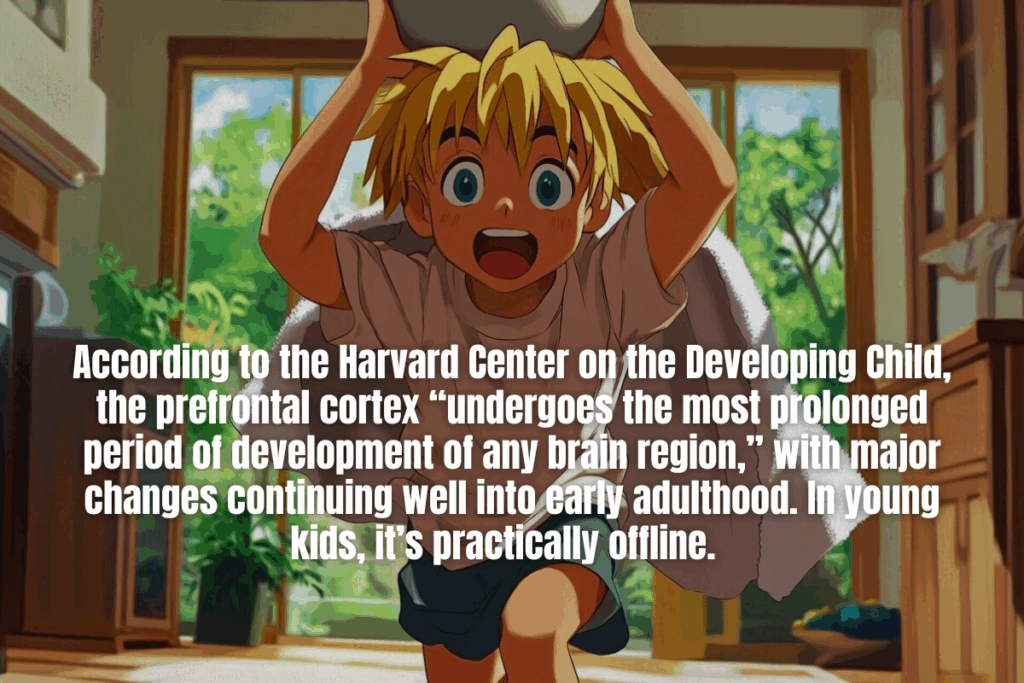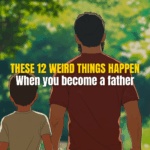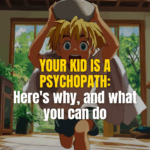Why young kids have no empathy, and what to do about it.
You ever look at your small child and think, “If you were an adult, I’d be terrified of you”?
Yeah, same.
Just today Salinger (Bird) decided she was going to paint her nails, but also paint the walls, in secret in the bathroom. When. I did finally catch her she simply smiled and said “daddy, it’s you and me,” referencing the adorable stick figures on the backroom wall. She laughed and then just skipped away…
It might feel like you’re raising a tiny sociopath, but here’s the truth:
You kind of are.
And that’s okay. Science backs it up.
Wait… are toddlers really little psychopaths?
Let’s clarify: I’m not saying your 3-year-old belongs in a true crime documentary. But developmentally? They genuinely lack empathy, emotional regulation, and impulse control. The things that make someone not a psychopath? Yeah, those aren’t online yet.
Here’s why:
1. The Prefrontal Cortex Isn’t Developed Yet
The prefrontal cortex is the part of the brain responsible for things like decision-making, self-control, and empathy. It’s the last part of the brain to fully develop and that doesn’t happen until your mid-20s.
According to the Harvard Center on the Developing Child, the prefrontal cortex “undergoes the most prolonged period of development of any brain region,” with major changes continuing well into early adulthood. In toddlers, it’s practically offline.
This is why your kid throws a toy across the room, then two seconds later wants a hug like nothing happened.
They’re not being manipulative. They’re just… primal.
2. They Don’t Feel Empathy the Way You Do
Empathy isn’t just a feeling, it’s a neurological process. It requires mirror neurons (the brain cells that allow us to “feel” someone else’s emotions) and social emotional learning to be well developed.
Research from the University of Chicago found that while babies show early signs of empathy, the ability to understand and care about others’ feelings in a consistent way doesn’t reliably emerge until age 5 to 7.
So if your kid laughs when you stub your toe, it’s not that they’re cruel. They literally just haven’t connected the dots between your pain and their behavior.
3. Impulse Control Is Basically Nonexistent
If toddlers were adults, they’d all be in jail.
Impulse control saying “no” to yourself in the moment, is regulated by the brain’s executive function. According to the American Academy of Pediatrics, children under 4 have limited capacity for this kind of control. They’re walking id-monsters.
This is why your toddler screams “I HATE YOU!” then cuddles you five minutes later. Or why they slap the dog and instantly cry when the dog walks away.
There’s no grand strategy behind their chaos. Just raw, unfiltered emotion and no filter to stop it.
So What’s a Dad Supposed to Do?
This is where your Stoic Dad training kicks in.
Because here’s the truth:
You’re their prefrontal cortex until theirs kicks in.
You are quite literally the stand-in for their self-control, reasoning, and emotional regulation. Not forever. But for now? Absolutely.
And that means…
1. Don’t Take It Personally
Your kid isn’t out to get you. They’re not evil. They’re just undeveloped.
Getting yelled at by a toddler is like being flipped off by a raccoon. Irritating, yes. Personal? Not at all.
When you stop assigning intent to their behavior, you free yourself up to actually guide them instead of reacting to them.
2. Model What You Want to See
You don’t scream at a kid for screaming. That’s like lighting a fire to teach fire safety.
Instead, be the calm in their chaos. As Dr. Dan Siegel (author of The Whole-Brain Child) puts it, “When we stay regulated, we help our child build a brain that can regulate.”
So the next time your kid bites you and then cries because you’re upset, remember: this is your moment. Show them what self-control looks like.
3. Narrate Feelings, Not Just Behavior
Instead of saying “That was mean,” try:
“You pushed your brother because you were mad. But hurting people isn’t how we handle big feelings.”
This doesn’t excuse their behavior. It teaches emotional vocabulary, which the National Scientific Council on the Developing Child says is key to long-term emotional intelligence.
Your job isn’t to punish away the behavior. It’s to build the skills that make that behavior unnecessary.

But What If They Keep Acting Like Tiny Sociopaths?
They will. For years.
But it won’t be forever.
Every time you regulate your own voice…
Every time you stay calm when they lose it…
Every time you model empathy instead of yelling…
You’re building their brain for them. Neuron by neuron. Habit by habit.
And even though it might not look like it’s working—you are absolutely shaping the kind of adult they’ll become.
Final Thought: You’re Not Raising a Perfect Kid. You’re Raising a Human.
And humans are messy. Especially the small ones.
So the next time your toddler throws a cup of yogurt across the room, deadpans you in the eyes, and says, “You clean it,” just remember…
You’re not parenting a monster.
You’re parenting someone who’s still becoming a person.
And your calm, your consistency, your presence—that’s what makes the difference.
Even if you secretly wonder sometimes if they’re planning your demise over Goldfish crackers.





